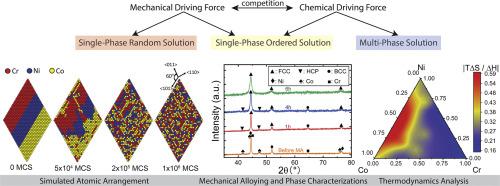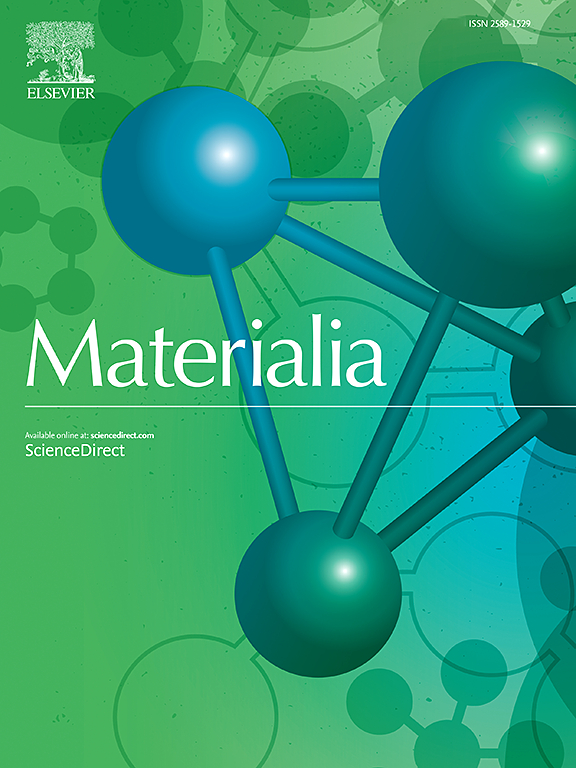Mechano-chemical competition in driven complex concentrated alloys
IF 3
Q2 MATERIALS SCIENCE, MULTIDISCIPLINARY
引用次数: 0
Abstract
Mechanically driven complex concentrated alloys can be formed by three or more types of elemental powders mixing into a solid solution through severe plastic deformation at temperatures much lower than the melting point of each element. While competition between the thermal and mechanical driving forces during forced mixing of binary systems with positive enthalpy of mixing is relatively well understood, the physics of mechanically driven mixing of multiple elements with negative mixing enthalpies remained unclear. In this work, we combined mechanical alloying (MA), X-ray diffraction (XRD), and kinetic Monte Carlo (kMC) simulations to systematically study the interplay between the chemical pairing potential and the mechanical strength of elemental pairs during the formation process of mechanically driven complex concentrated alloys. We demonstrate that the chemical and mechanical forces play a competing role in the mixing of ternary complex concentrated alloys with negative mixing enthalpies. The chemical driving force favors a chemically ordered atomic structure, while the mechanical force encourages a random atomic arrangement. We reveal the energetic basis of this competition as the gain and loss in mixing enthalpy and configurational entropy. Following this fundamental understanding, three types of mixing mechanisms and their corresponding steady-state phases are defined. We show that the molar content of the element with the lowest average mixing enthalpy governs the mixing mechanisms and thus determines the energetic stabilization of the steady-state phases. A theoretical phase prediction map is provided for alloy design. We synthesized a nanocrystalline equiatomic NiCoCr coating under the guidelines of the map, which presents exceptional mechanical properties achieved by the mechano-chemical mixing.

驱动型复杂浓缩合金的机械化学竞争
机械驱动的复杂浓缩合金可以由三种或更多种元素粉末在远低于每种元素熔点的温度下通过剧烈的塑性变形混合成固溶体而形成。虽然热驱动力和机械驱动力之间的竞争在二元系统的强制混合具有正的混合焓相对较好理解,物理驱动的多元素混合具有负的混合焓仍然不清楚。本文采用机械合金化(MA)、x射线衍射(XRD)和动力学蒙特卡罗(kMC)模拟相结合的方法,系统研究了机械驱动复合浓缩合金形成过程中化学配对势与元素对机械强度之间的相互作用。我们证明了化学力和机械力在混合焓为负的三元络合浓合金的混合中起着竞争作用。化学驱动力倾向于化学上有序的原子结构,而机械力则倾向于随机的原子排列。我们揭示了这种竞争的能量基础,即混合焓和构型熵的得失。根据这一基本认识,定义了三种类型的混合机制及其相应的稳态相。我们发现平均混合焓最低的元素的摩尔含量决定了混合机制,从而决定了稳态相的能量稳定。为合金设计提供了理论相预测图。我们在图的指导下合成了纳米晶等原子NiCoCr涂层,该涂层通过机械化学混合获得了优异的力学性能。
本文章由计算机程序翻译,如有差异,请以英文原文为准。
求助全文
约1分钟内获得全文
求助全文
来源期刊

Materialia
MATERIALS SCIENCE, MULTIDISCIPLINARY-
CiteScore
6.40
自引率
2.90%
发文量
345
审稿时长
36 days
期刊介绍:
Materialia is a multidisciplinary journal of materials science and engineering that publishes original peer-reviewed research articles. Articles in Materialia advance the understanding of the relationship between processing, structure, property, and function of materials.
Materialia publishes full-length research articles, review articles, and letters (short communications). In addition to receiving direct submissions, Materialia also accepts transfers from Acta Materialia, Inc. partner journals. Materialia offers authors the choice to publish on an open access model (with author fee), or on a subscription model (with no author fee).
 求助内容:
求助内容: 应助结果提醒方式:
应助结果提醒方式:


